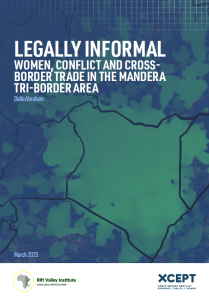In the Mandera triangle—a pastoralist region encompassing the point at which the borders of Kenya, Ethiopia and Somalia meet—the reality of local and cross-border trade often diverges widely from official state policies of control. This disjunction has created a grey zone in which policy contradictions form an integral part of the regulatory environment. With this backdrop in mind, the report explores how small-scale women traders work to secure their livelihoods, damp down conflict and navigate shifting political sands.
Summary
- Changing lifestyle and livelihood habits, alongside internal or cross-border displacement and the opportunities presented by Kenyan devolution, have led to rising numbers of women in Mandera playing a critical role in household income. As such, engaging in small-scale cross-border trade has had a transformative impact for many of the area’s women, with the marketplace serving as an important arena for increasing their agency.
- Although the Kenya–Somalia border has officially been closed for trade since 2011, practices on the ground are marked by a fair degree of openness. By contrast, Ethiopia has been vocal in criticizing informal/unregulated/illicit cross-border trade, and backed this up with action.
- Informal taxation rates follow stable arrangements known among traders, transporters and the police. This creates a predictable environment that helps protect small-scale cross-border traders from the fluctuating demands of rogue police officers. Thus, rent-seeking has created a kind of symbiotic relationship, with small-scale traders incorporating the exploitative behaviour of border control police officers into their trade-based norms.
- Kenyan intentions to re-open the border and formalize cross-border trade have been received with varying degrees of enthusiasm by different actors in Mandera. While some are unconcerned about the potential re-opening of the border, others are anxious about the associated formalization investments that have been proposed. When the Kenyan and Somali governments jointly announced a reopening plan in May 2023 there was a significant increase in the number and severity of terror attacks.
- Women have responded to emerging market needs with adaptive strategies. For instance, new tarmac roads and street lights have made it easier for women to sell food along the streets into the early evening. On the other hand, women have sometimes exerted their agency by resisting investments aimed at making markets more formal without due regard for existing market arrangements.
- The emergence of a transnational peace infrastructure led by government agencies in close collaboration with local civil society organizations and cultural institutions has reinforced a positive trend towards women’s empowerment. Moreover, peace committees involving women’s groups from all three border points have created a diverse network that now provides an important platform for members to share both their personal experiences and important market information. Peace WhatsApp groups are also used to place orders for goods and commodities, or ask for business advice.
- Despite the tensions associated with ‘negotiated democracy’ and the patriarchal biases evident in county government following the Kenyan devolution process, efforts have been made to benefit women traders and women-owned businesses, including awarding them contracts. Access to such contracts is, however, based first and foremost on ethnicity, Thus, despite the shared challenges they face, the region’s women are often constrained by ethno-national demands.
XCEPT PROGRAMME
This report is a product of the FCDO’s Cross-Border Conflict Evidence, Policy and Trends (XCEPT) programme, funded by UK aid from the UK government. XCEPT brings together leading experts to examine conflict-affected borderlands, how conflicts connect across borders, and the factors that shape violent and peaceful behaviour. The programme carries out research to better understand the causes and impacts of conflict in border areas and their international dimensions. It supports more effective policymaking and development programming and builds the skills of local partners. The views expressed do not necessarily reflect the UK government’s official policies.




